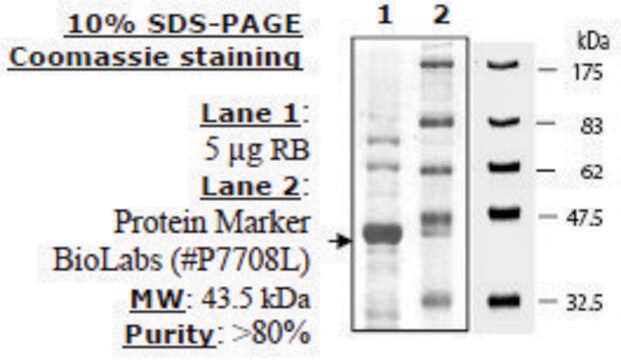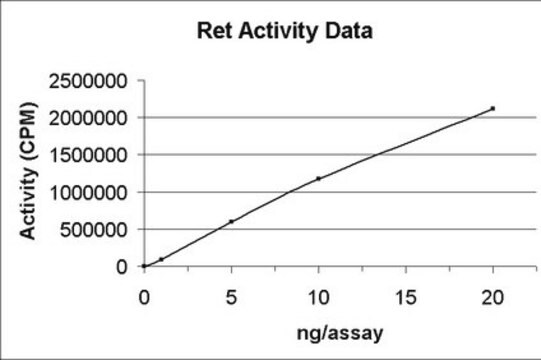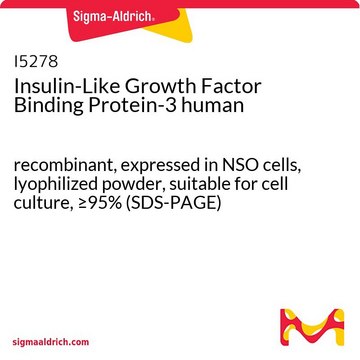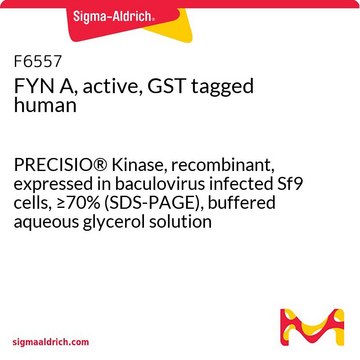F8055
FGR, active, GST tagged human
PRECISIO® Kinase, recombinant, expressed in baculovirus infected Sf9 cells, ≥70% (SDS-PAGE), buffered aqueous glycerol solution
Synonym(s):
SRC2, c-fgr, p55c-fgr
Sign Into View Organizational & Contract Pricing
All Photos(1)
About This Item
UNSPSC Code:
51111800
NACRES:
NA.32
Recommended Products
recombinant
expressed in baculovirus infected Sf9 cells
Quality Level
product line
PRECISIO® Kinase
Assay
≥70% (SDS-PAGE)
form
buffered aqueous glycerol solution
specific activity
242-328 nmol/min·mg
mol wt
~86 kDa
UniProt accession no.
shipped in
dry ice
storage temp.
−70°C
Gene Information
human ... FGR(2268)
General description
Src family of tyrosine kinases is grouped into two classes- those with wide range of expression, and those with narrow range of tissue expression. Fgr belongs to the latter group. This protein has six functional domains namely, Src homology domain 4 (SH4), a unique domain, SH3 domain, SH2 domain, the catalytic SH1 domain, and a regulatory region in C-terminal. It is expressed in natural killer cells, monocytes and granulocytes.
Biochem/physiol Actions
FGR interacts with Fc?RII and thus, regulates Fc?RII-mediated signaling cascade.
This protein is expressed in B-cells of patients with Epstein-Barr virus-associated lymphoproliferative disease and chronic lymphocytic leukemia. It is also expressed in normal mantle zone B-cells and is controlled developmentally during the differentiation of myelomonocytes.
This protein is expressed in B-cells of patients with Epstein-Barr virus-associated lymphoproliferative disease and chronic lymphocytic leukemia. It is also expressed in normal mantle zone B-cells and is controlled developmentally during the differentiation of myelomonocytes.
Physical form
Supplied in 50 mM Tris-HCl, pH 7.5, with 150 mM NaCl, 0.2 5mM DTT, 0.1 mM EGTA, 0.1 mM EDTA, 0.1 mM PMSF, and 25% glycerol.
Legal Information
PRECISIO is a registered trademark of Merck KGaA, Darmstadt, Germany
Storage Class Code
10 - Combustible liquids
WGK
WGK 1
Flash Point(F)
Not applicable
Flash Point(C)
Not applicable
Personal Protective Equipment
dust mask type N95 (US), Eyeshields, Gloves
Certificates of Analysis (COA)
Search for Certificates of Analysis (COA) by entering the products Lot/Batch Number. Lot and Batch Numbers can be found on a product’s label following the words ‘Lot’ or ‘Batch’.
Already Own This Product?
Find documentation for the products that you have recently purchased in the Document Library.
C L Willman et al.
Proceedings of the National Academy of Sciences of the United States of America, 84(13), 4480-4484 (1987-07-01)
To study the expression of src-related protooncogenes during the development of myeloid cells and the regulation of these genes by the colony-stimulating factors that control myelopoiesis, normal monocytic cells at distinct stages of differentiation were derived from murine bone marrow
F Hamada et al.
Proceedings of the National Academy of Sciences of the United States of America, 90(13), 6305-6309 (1993-07-01)
The interaction of Fc receptors with antibody-antigen complexes activates multiple biological functions in hematopoietic cells. Recently, protein-tyrosine phosphorylation has been suggested to be involved in Fc receptor-mediated cell signaling. Here we show that the Src-like protein-tyrosine kinase Fgr, which is
M S Cheah et al.
Nature, 319(6050), 238-240 (1986-01-16)
Several acute transforming retroviruses encode tyrosine-specific protein kinases which possess structural and functional relationships to cell-surface receptors for certain growth factors. One such tyrosine kinase is encoded by the onc gene, v-fgr, of Gardner-Rasheed feline sarcoma virus (GR-FeSV). Recently, we
D C Link et al.
Blood, 85(2), 472-479 (1995-01-15)
The proto-oncogene c-fgr is a member of the c-src gene family of cytoplasmic tyrosine kinases. Previous studies have suggested that it is normally expressed in neutrophils, monocytes, macrophages, and natural killer cells. c-fgr is also expressed in the B cells
A G Tatosyan et al.
Biochemistry. Biokhimiia, 65(1), 49-58 (2000-03-07)
Tyrosine kinases of the Src family are involved in different signal transduction pathways in cells. The corresponding genes participate in such vital processes as growth, differentiation, adhesion, transcription, etc. Specific structural changes confer oncogenic properties to the Src protein. In
Our team of scientists has experience in all areas of research including Life Science, Material Science, Chemical Synthesis, Chromatography, Analytical and many others.
Contact Technical Service





